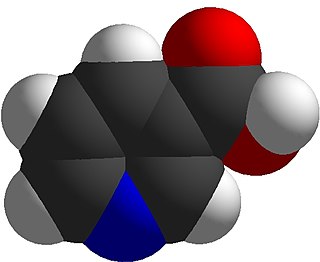
Niacin, also known as nicotinic acid, is an organic compound and a vitamer of vitaminB3, an essential human nutrient. It can be manufactured by plants and animals from the amino acid tryptophan. Niacin is obtained in the diet from a variety of whole and processed foods, with highest contents in fortified packaged foods, meat, poultry, red fish such as tuna and salmon, lesser amounts in nuts, legumes and seeds. Niacin as a dietary supplement is used to treat pellagra, a disease caused by niacin deficiency. Signs and symptoms of pellagra include skin and mouth lesions, anemia, headaches, and tiredness. Many countries mandate its addition to wheat flour or other food grains, thereby reducing the risk of pellagra.

Statins, also known as HMG-CoA reductase inhibitors, are a class of lipid-lowering medications that reduce illness and mortality in those who are at high risk of cardiovascular disease. They are the most commonly prescribed cholesterol-lowering drugs.
Lipid-lowering agents, also sometimes referred to as hypolipidemic agents, cholesterol-lowering drugs, or antihyperlipidemic agents are a diverse group of pharmaceuticals that are used to lower the level of lipids and lipoproteins such as cholesterol, in the blood (hyperlipidemia). The American Heart Association recommends the descriptor 'lipid lowering agent' be used for this class of drugs rather than the term 'hypolipidemic'.

In pharmacology, the fibrates are a class of amphipathic carboxylic acids and esters. They are derivatives of fibric acid. They are used for a range of metabolic disorders, mainly hypercholesterolemia, and are therefore hypolipidemic agents.
Dyslipidemia is a metabolic disorder characterized by abnormally high or low amounts of any or all lipids or lipoproteins in the blood. Dyslipidemia is a risk factor for the development of atherosclerotic cardiovascular diseases (ASCVD), which include coronary artery disease, cerebrovascular disease, and peripheral artery disease. Although dyslipidemia is a risk factor for ASCVD, abnormal levels don't mean that lipid lowering agents need to be started. Other factors, such as comorbid conditions and lifestyle in addition to dyslipidemia, is considered in a cardiovascular risk assessment. In developed countries, most dyslipidemias are hyperlipidemias; that is, an elevation of lipids in the blood. This is often due to diet and lifestyle. Prolonged elevation of insulin resistance can also lead to dyslipidemia. Likewise, increased levels of O-GlcNAc transferase (OGT) may cause dyslipidemia.

Atorvastatin, sold under the brand name Lipitor among others, is a statin medication used to prevent cardiovascular disease in those at high risk and to treat abnormal lipid levels. For the prevention of cardiovascular disease, statins are a first-line treatment. It is taken by mouth.

Simvastatin, sold under the brand name Zocor among others, is a statin, a type of lipid-lowering medication. It is used along with exercise, diet, and weight loss to decrease elevated lipid levels. It is also used to decrease the risk of heart problems in those at high risk. It is taken by mouth.

Rosuvastatin, sold under the brand name Crestor among others, is a statin medication, used to prevent cardiovascular disease in those at high risk and treat abnormal lipids. It is recommended to be used together with dietary changes, exercise, and weight loss. It is taken orally.

Pravastatin, sold under the brand name Pravachol among others, is a statin medication, used for preventing cardiovascular disease in those at high risk and treating abnormal lipids. It is suggested to be used together with diet changes, exercise, and weight loss. It is taken by mouth.

Lovastatin, sold under the brand name Mevacor among others, is a statin medication, to treat high blood cholesterol and reduce the risk of cardiovascular disease. Its use is recommended together with lifestyle changes. It is taken by mouth.

Gemfibrozil, sold under the brand name Lopid among others, is a medication used to treat abnormal blood lipid levels. It is generally less preferred than statins. Use is recommended together with dietary changes and exercise. It is unclear if it changes the risk of heart disease. It is taken by mouth.

Ezetimibe is a medication used to treat high blood cholesterol and certain other lipid abnormalities. Generally it is used together with dietary changes and a statin. Alone, it is less preferred than a statin. It is taken by mouth. It is also available in the fixed combinations ezetimibe/simvastatin, ezetimibe/atorvastatin, ezetimibe/rosuvastatin, and ezetimibe/bempedoic acid.

Ezetimibe/simvastatin is a drug combination used for the treatment of dyslipidemia. It is a combination of ezetimibe and the statin drug simvastatin.

Fenofibrate, is an oral medication of the fibrate class used to treat abnormal blood lipid levels. It is less commonly used compared than statins because it treats a different type of cholesterol abnormality to statins. While statins have strong evidence for reducing heart disease and death, there is evidence to suggest that fenofibrate also reduces the risk of heart disease and death. However, this seems only to apply to specific populations of people with elevated triglyceride levels and reduced high-density lipoprotein (HDL) cholesterol. Its use is recommended together with dietary changes.

Niacin/lovastatin was a drug combination used for the treatment of dyslipidemia. It was a combination of the lipid-modifying drug/vitamin niacin in extended release form and the statin drug lovastatin. The combination preparation was developed by Kos Pharmaceuticals, Inc., which was acquired by Abbott Laboratories in 2006, subsequently transferred to AbbVie Inc. when that company was spun off from Abbott in January 2013.

Ethyl eicosapentaenoic acid, sold under the brand name Vascepa among others, is a medication used to treat dyslipidemia and hypertriglyceridemia. It is used in combination with changes in diet in adults with hypertriglyceridemia ≥ 150 mg/dL. Further, it is often required to be used with a statin.

Sitagliptin/simvastatin, sold under the brand name Juvisync, is a fixed-dose combination anti-diabetic medication used to treat type 2 diabetes and hypercholesterolemia. It contains sitagliptin and simvastatin. Sitagliptin is a dipeptidyl peptidase-4 inhibitor and simvastatin is an HMG-CoA reductase inhibitor. These two disorders commonly occur in people at the same time, and have been typically treated with administration of these medications separately. The combination was approved in 2011, and sold under the brand name Juvisync by Merck. Juvisync was later removed from the market in 2013, due to business reasons.
Bempedoic acid, sold under the brand name Nexletol among others, is a medication for the treatment of hypercholesterolemia.
Bempedoic acid/ezetimibe, sold under the brand name Nexlizet among others, is a fixed-dose combination medication used for the treatment of high cholesterol. It is a combination of bempedoic acid and ezetimibe.
Fenofibrate/simvastatin, sold under the brand name Cholib, is a fixed-dose combination medication used to treat abnormal blood lipid levels when used in combination with a low-fat diet and exercise. It contains fenofibrate and simvastatin.














